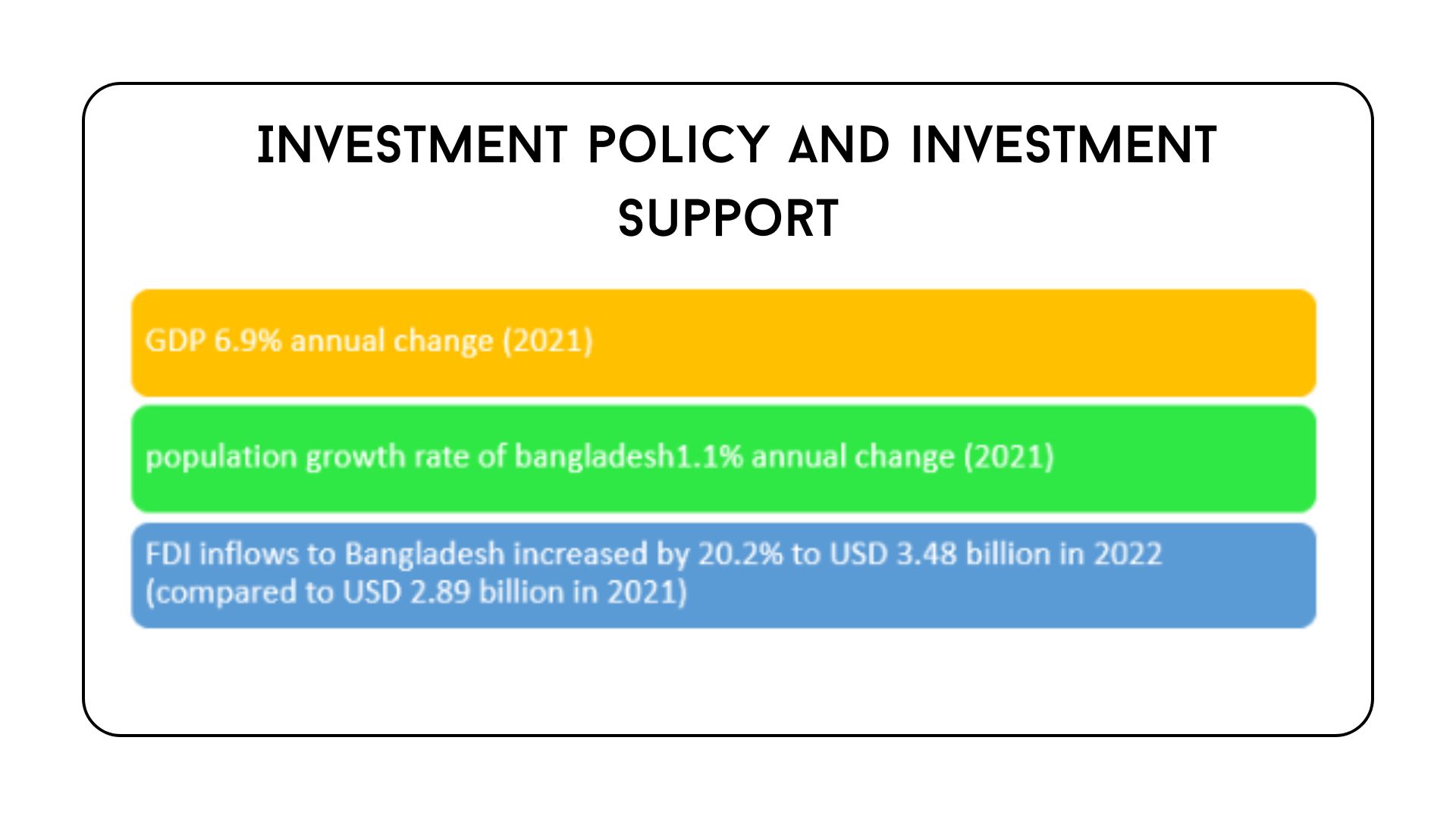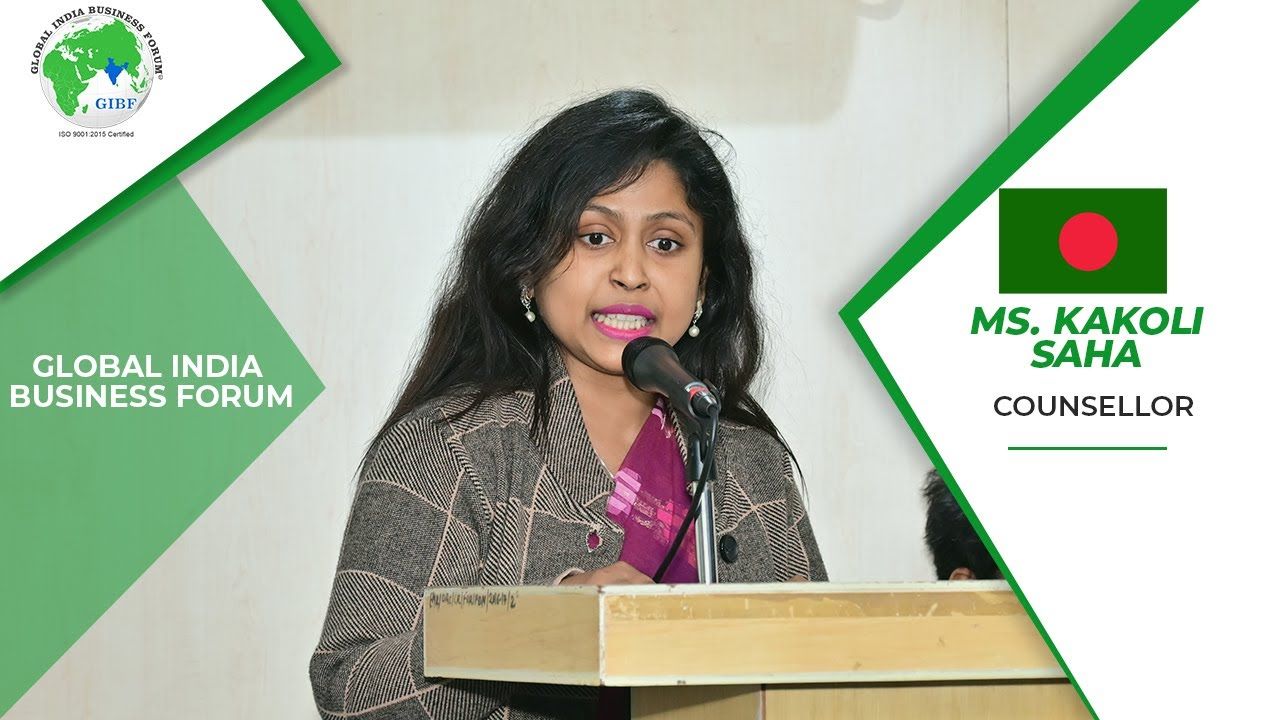
Bangladesh emerges as one of the fastest-growing economies globally, maintaining a
remarkable record of consistent GDP growth without any negative slumps over the last
three decades. With an impressive GDP growth rate exceeding 7% in the past decade,
Bangladesh stands out among emerging markets. This growth is supported by political
stability under a democratic system and effective monetary and fiscal management,
ensuring steady inflation rates. Moreover, the country boasts high connectivity, a
competitive market, a business-friendly environment, and a cost-effective structure,
offering lucrative returns for investors.

The Bangladeshi government prioritizes investment,
aiming to establish an open, predictable, and competitive climate to achieve development
goals. Energy prices in Bangladesh are highly competitive in the region, further
enhancing its attractiveness to investors. Legal protections for foreign investments
through acts like the Foreign Private Investment (Promotion and Protection) Act of 1980
safeguard against expropriation and provide for equitable treatment, exit strategies,
and capital repatriation.

Efforts to create a contemporary business climate
through comprehensive reforms across various spheres demonstrate Bangladesh's commitment
to fostering a conducive environment for business. The country's legal and policy
framework favours foreign investment, reflecting its warm attitude towards investors.
With a youthful workforce and potential in technical education, Bangladesh offers ample
opportunities for outsourcing and ICT sector growth, supported by tech parks across key
cities.

The country's robust consumer demand, fueled by a
population exceeding 160 million, drives growth across various sectors, including
consumer goods and fintech. Additionally, Bangladesh's strategic geographical position
as a gateway to the Asia-Pacific region facilitates access to large markets and offers
advantages in terms of low labour costs. Dhaka, the capital city and economic hub,
boasts well-developed communication infrastructure and serves as a vital centre for
trade and finance in Eastern South Asia.

Bangladesh's position in the global value chain as a
competitive supplier is reinforced by numerous bilateral and multilateral agreements,
including free trade agreements with the EU and other developed nations. The government
continues to offer incentives, tax exemptions, and policy reforms to encourage further
investment and address infrastructural deficiencies. Overall, the economic and
legislative environment in Bangladesh remains favourable for foreign investors,
presenting a compelling case for businesses seeking growth opportunities in the region.

Bangladesh has made significant strides in its development journey, poised to graduate
from least developed country (LDC) status within a decade. Industries such as mobile
telephony, power generation, and financial services have seen some limited impact from
FDI.

To address these challenges, the Investment Promotion and Protection Review (IPR)
recommends actions under two main pillars: enabling investment for sustainable
development through an improved regulatory framework and enhancing infrastructure for
sustainable development through FDI. The current investment law, while relatively open
to FDI, has limitations in scope and coverage, leaving room for restrictive sector-level
regulations. For instance, ownership restrictions and ministry approvals are required
for industries deemed "controlled," while high-growth sectors like ready-made garments
and pharmaceuticals face discouragement of FDI.

To attract more FDI and improve the investment climate, the IPR calls for the adoption
of a modern investment law and regulatory reforms addressing issues such as foreign
exchange regulations, corporate taxation, land access, skills development, and public
administration.

The strategic focus, at the government's request, is on attracting FDI
through public-private partnerships (PPPs) to upgrade critical infrastructure such as
electricity, roads, and ports. In the electricity sector, Bangladesh aims to increase
supply to address shortages and meet growing demand.

While some FDI has been attracted
through power purchase agreements, further government action is needed to encourage
larger inflows, including pricing reforms to reflect costs and promotion of renewable
energies.
Regarding road infrastructure, there are promising PPP
opportunities with a pipeline of priority highway projects.
 Bangladesh emerges as one of the fastest-growing economies globally, maintaining a
remarkable record of consistent GDP growth without any negative slumps over the last
three decades. With an impressive GDP growth rate exceeding 7% in the past decade,
Bangladesh stands out among emerging markets. This growth is supported by political
stability under a democratic system and effective monetary and fiscal management,
ensuring steady inflation rates. Moreover, the country boasts high connectivity, a
competitive market, a business-friendly environment, and a cost-effective structure,
offering lucrative returns for investors.
Bangladesh emerges as one of the fastest-growing economies globally, maintaining a
remarkable record of consistent GDP growth without any negative slumps over the last
three decades. With an impressive GDP growth rate exceeding 7% in the past decade,
Bangladesh stands out among emerging markets. This growth is supported by political
stability under a democratic system and effective monetary and fiscal management,
ensuring steady inflation rates. Moreover, the country boasts high connectivity, a
competitive market, a business-friendly environment, and a cost-effective structure,
offering lucrative returns for investors.
 The Bangladeshi government prioritizes investment,
aiming to establish an open, predictable, and competitive climate to achieve development
goals. Energy prices in Bangladesh are highly competitive in the region, further
enhancing its attractiveness to investors. Legal protections for foreign investments
through acts like the Foreign Private Investment (Promotion and Protection) Act of 1980
safeguard against expropriation and provide for equitable treatment, exit strategies,
and capital repatriation.
The Bangladeshi government prioritizes investment,
aiming to establish an open, predictable, and competitive climate to achieve development
goals. Energy prices in Bangladesh are highly competitive in the region, further
enhancing its attractiveness to investors. Legal protections for foreign investments
through acts like the Foreign Private Investment (Promotion and Protection) Act of 1980
safeguard against expropriation and provide for equitable treatment, exit strategies,
and capital repatriation.
 Efforts to create a contemporary business climate
through comprehensive reforms across various spheres demonstrate Bangladesh's commitment
to fostering a conducive environment for business. The country's legal and policy
framework favours foreign investment, reflecting its warm attitude towards investors.
With a youthful workforce and potential in technical education, Bangladesh offers ample
opportunities for outsourcing and ICT sector growth, supported by tech parks across key
cities.
Efforts to create a contemporary business climate
through comprehensive reforms across various spheres demonstrate Bangladesh's commitment
to fostering a conducive environment for business. The country's legal and policy
framework favours foreign investment, reflecting its warm attitude towards investors.
With a youthful workforce and potential in technical education, Bangladesh offers ample
opportunities for outsourcing and ICT sector growth, supported by tech parks across key
cities.
 The country's robust consumer demand, fueled by a
population exceeding 160 million, drives growth across various sectors, including
consumer goods and fintech. Additionally, Bangladesh's strategic geographical position
as a gateway to the Asia-Pacific region facilitates access to large markets and offers
advantages in terms of low labour costs. Dhaka, the capital city and economic hub,
boasts well-developed communication infrastructure and serves as a vital centre for
trade and finance in Eastern South Asia.
The country's robust consumer demand, fueled by a
population exceeding 160 million, drives growth across various sectors, including
consumer goods and fintech. Additionally, Bangladesh's strategic geographical position
as a gateway to the Asia-Pacific region facilitates access to large markets and offers
advantages in terms of low labour costs. Dhaka, the capital city and economic hub,
boasts well-developed communication infrastructure and serves as a vital centre for
trade and finance in Eastern South Asia.
 Bangladesh's position in the global value chain as a
competitive supplier is reinforced by numerous bilateral and multilateral agreements,
including free trade agreements with the EU and other developed nations. The government
continues to offer incentives, tax exemptions, and policy reforms to encourage further
investment and address infrastructural deficiencies. Overall, the economic and
legislative environment in Bangladesh remains favourable for foreign investors,
presenting a compelling case for businesses seeking growth opportunities in the region.
Bangladesh's position in the global value chain as a
competitive supplier is reinforced by numerous bilateral and multilateral agreements,
including free trade agreements with the EU and other developed nations. The government
continues to offer incentives, tax exemptions, and policy reforms to encourage further
investment and address infrastructural deficiencies. Overall, the economic and
legislative environment in Bangladesh remains favourable for foreign investors,
presenting a compelling case for businesses seeking growth opportunities in the region.
 Bangladesh has made significant strides in its development journey, poised to graduate
from least developed country (LDC) status within a decade. Industries such as mobile
telephony, power generation, and financial services have seen some limited impact from
FDI.
Bangladesh has made significant strides in its development journey, poised to graduate
from least developed country (LDC) status within a decade. Industries such as mobile
telephony, power generation, and financial services have seen some limited impact from
FDI.  To address these challenges, the Investment Promotion and Protection Review (IPR)
recommends actions under two main pillars: enabling investment for sustainable
development through an improved regulatory framework and enhancing infrastructure for
sustainable development through FDI. The current investment law, while relatively open
to FDI, has limitations in scope and coverage, leaving room for restrictive sector-level
regulations. For instance, ownership restrictions and ministry approvals are required
for industries deemed "controlled," while high-growth sectors like ready-made garments
and pharmaceuticals face discouragement of FDI.
To address these challenges, the Investment Promotion and Protection Review (IPR)
recommends actions under two main pillars: enabling investment for sustainable
development through an improved regulatory framework and enhancing infrastructure for
sustainable development through FDI. The current investment law, while relatively open
to FDI, has limitations in scope and coverage, leaving room for restrictive sector-level
regulations. For instance, ownership restrictions and ministry approvals are required
for industries deemed "controlled," while high-growth sectors like ready-made garments
and pharmaceuticals face discouragement of FDI.

 To attract more FDI and improve the investment climate, the IPR calls for the adoption
of a modern investment law and regulatory reforms addressing issues such as foreign
exchange regulations, corporate taxation, land access, skills development, and public
administration.
To attract more FDI and improve the investment climate, the IPR calls for the adoption
of a modern investment law and regulatory reforms addressing issues such as foreign
exchange regulations, corporate taxation, land access, skills development, and public
administration. The strategic focus, at the government's request, is on attracting FDI
through public-private partnerships (PPPs) to upgrade critical infrastructure such as
electricity, roads, and ports. In the electricity sector, Bangladesh aims to increase
supply to address shortages and meet growing demand.
The strategic focus, at the government's request, is on attracting FDI
through public-private partnerships (PPPs) to upgrade critical infrastructure such as
electricity, roads, and ports. In the electricity sector, Bangladesh aims to increase
supply to address shortages and meet growing demand.  While some FDI has been attracted
through power purchase agreements, further government action is needed to encourage
larger inflows, including pricing reforms to reflect costs and promotion of renewable
energies.
Regarding road infrastructure, there are promising PPP
opportunities with a pipeline of priority highway projects.
While some FDI has been attracted
through power purchase agreements, further government action is needed to encourage
larger inflows, including pricing reforms to reflect costs and promotion of renewable
energies.
Regarding road infrastructure, there are promising PPP
opportunities with a pipeline of priority highway projects.
